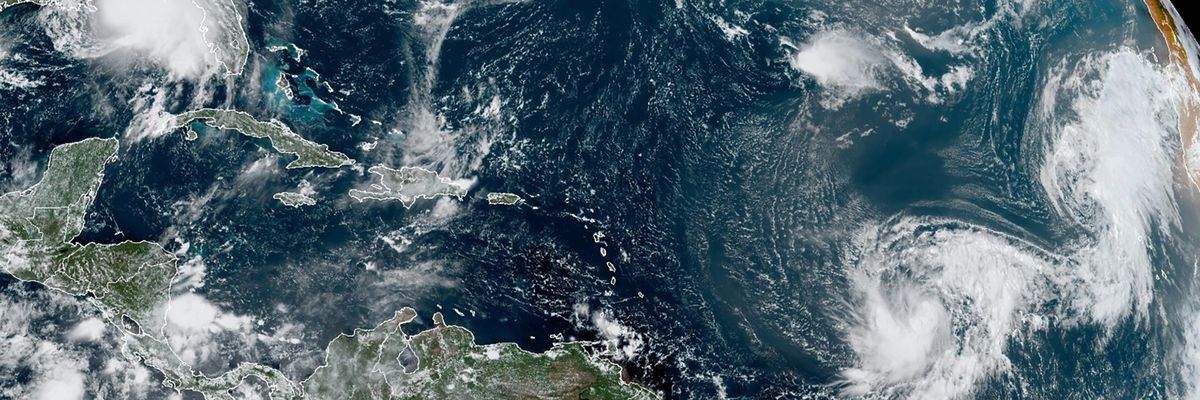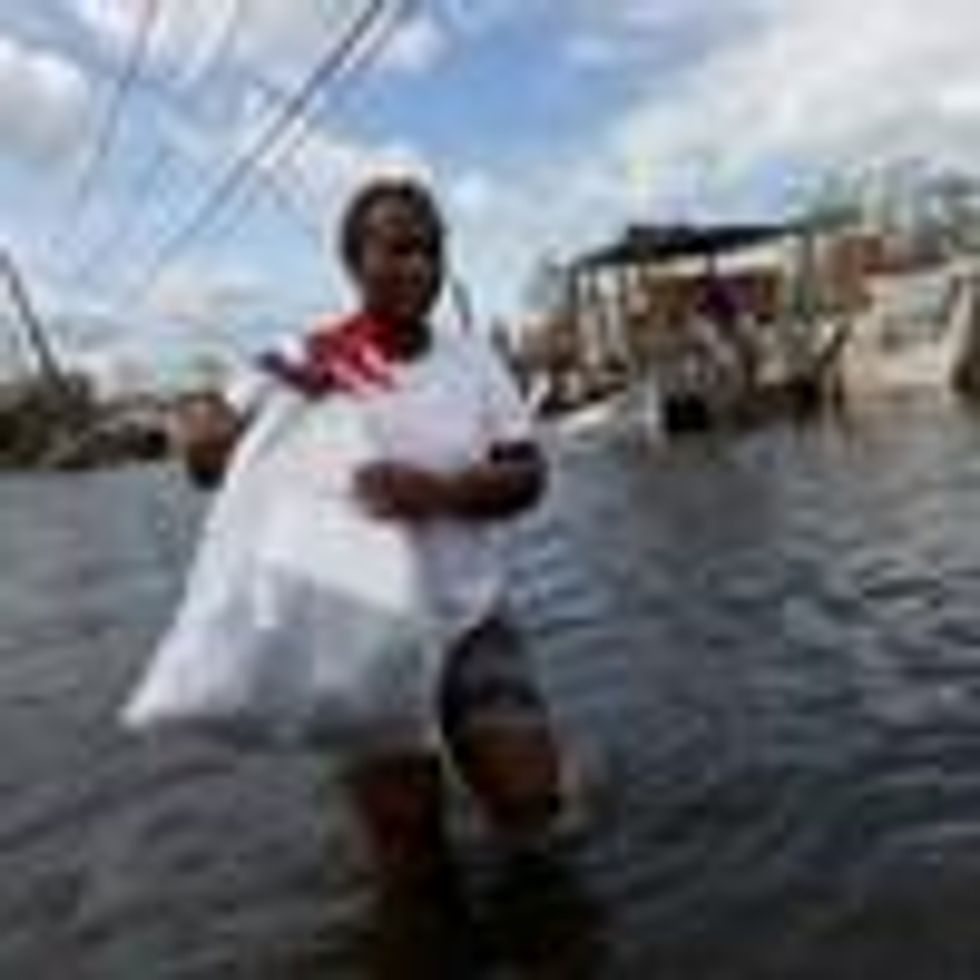

SUBSCRIBE TO OUR FREE NEWSLETTER
Daily news & progressive opinion—funded by the people, not the corporations—delivered straight to your inbox.
5
#000000
#FFFFFF
To donate by check, phone, or other method, see our More Ways to Give page.


Daily news & progressive opinion—funded by the people, not the corporations—delivered straight to your inbox.

A satellite image shows five tropical cyclones churning in the Atlantic basin on September 14, 2020. The storms, from left, are Hurricane Sally over the Gulf of Mexico, Hurricane Paulette over Bermuda, the remnants of Tropical Storm Rene, and Tropical Storms Teddy and Vicky. (Image credit: NOAA)
Global heating caused by human activity could warm oceans enough to fuel hurricanes and tropical storms that strike cities as far north as Boston, a new study published Wednesday projects.
"This represents an important, under-estimated risk of climate change," Joshua Studholme of Yale University, the study's lead author, said in a statement. "This research predicts that the 21st century's tropical cyclones will likely occur over a wider range of latitudes than has been the case on Earth for the last 3 million years."
That means that storms like Tropical Storm Henri, which battered New England in August, and Subtropical Storm Alpha, which made landfall in Portugal a month later, could be indicators of a new normal.
According to the study:
Tropical cyclones (TCs, also known as hurricanes and typhoons) generally form at low latitudes with access to the warm waters of the tropical oceans, but far enough off the equator to allow planetary rotation to cause aggregating convection to spin up into coherent vortices. Yet, current prognostic frameworks for TC latitudes make contradictory predictions for climate change.
Simulations of past warm climates, such as the Eocene and Pliocene, show that TCs can form and intensify at higher latitudes than of those during pre-industrial conditions. Observations and model projections for the 21st century indicate that TCs may again migrate poleward in response to anthropogenic greenhouse gas emissions, which poses profound risks to the planet's most populous regions.
"We conclude that 21st century TCs will most probably occupy a broader range of latitudes than those of the past three million years as low-latitude genesis will be supplemented with increasing mid-latitude TC favorability," the study's authors project, "although precise estimates for future migration remain beyond current methodologies."
Gan Zhang, an atmospheric scientist who was not involved in the study, told told the BBC that "these tropical cyclone changes, plus pronounced coastal sea level rise, might compound potential societal impacts."
With 21 named storms, the 2021 Atlantic hurricane season was the third-most active on record.
According to NPR:
Hurricane Ida alone accounts for more than $60 billion in damages--making it one of the five most costly U.S. hurricanes on record since 1980, according to the National Oceanic and Atmospheric Administration (NOAA). Ida hit Louisiana as a Category 4 hurricane with a dangerous storm surge and strong winds, and it remained dangerous and destructive for roughly 1,000 miles, as it brought catastrophic flooding to the mid-Atlantic. Ida was blamed for 26 deaths in Louisiana, and at least 50 deaths in the Northeast.
Four storms--Tropical Storm Elsa in July, Tropical Storm Fred in August, Hurricane Nicholas in September, and Ida in August and September--each inflicted more than $1 billion in costs, NOAA said.
This was also the seventh straight year in which a tropical storm was named prior to the official June 1 start of the hurricane season, according to NOAA.
Related Content

In August, the Intergovernmental Panel on Climate Change published a report projecting more intense tropical cyclone activity due to climate change.
"The proportion of intense tropical cyclones, average peak tropical cyclone wind speeds, and peak wind speeds of the most intense tropical cyclones will increase on the global scale with increasing global warming," the report stated.
Dear Common Dreams reader, The U.S. is on a fast track to authoritarianism like nothing I've ever seen. Meanwhile, corporate news outlets are utterly capitulating to Trump, twisting their coverage to avoid drawing his ire while lining up to stuff cash in his pockets. That's why I believe that Common Dreams is doing the best and most consequential reporting that we've ever done. Our small but mighty team is a progressive reporting powerhouse, covering the news every day that the corporate media never will. Our mission has always been simple: To inform. To inspire. And to ignite change for the common good. Now here's the key piece that I want all our readers to understand: None of this would be possible without your financial support. That's not just some fundraising cliche. It's the absolute and literal truth. We don't accept corporate advertising and never will. We don't have a paywall because we don't think people should be blocked from critical news based on their ability to pay. Everything we do is funded by the donations of readers like you. Will you donate now to help power the nonprofit, independent reporting of Common Dreams? Thank you for being a vital member of our community. Together, we can keep independent journalism alive when it’s needed most. - Craig Brown, Co-founder |
Global heating caused by human activity could warm oceans enough to fuel hurricanes and tropical storms that strike cities as far north as Boston, a new study published Wednesday projects.
"This represents an important, under-estimated risk of climate change," Joshua Studholme of Yale University, the study's lead author, said in a statement. "This research predicts that the 21st century's tropical cyclones will likely occur over a wider range of latitudes than has been the case on Earth for the last 3 million years."
That means that storms like Tropical Storm Henri, which battered New England in August, and Subtropical Storm Alpha, which made landfall in Portugal a month later, could be indicators of a new normal.
According to the study:
Tropical cyclones (TCs, also known as hurricanes and typhoons) generally form at low latitudes with access to the warm waters of the tropical oceans, but far enough off the equator to allow planetary rotation to cause aggregating convection to spin up into coherent vortices. Yet, current prognostic frameworks for TC latitudes make contradictory predictions for climate change.
Simulations of past warm climates, such as the Eocene and Pliocene, show that TCs can form and intensify at higher latitudes than of those during pre-industrial conditions. Observations and model projections for the 21st century indicate that TCs may again migrate poleward in response to anthropogenic greenhouse gas emissions, which poses profound risks to the planet's most populous regions.
"We conclude that 21st century TCs will most probably occupy a broader range of latitudes than those of the past three million years as low-latitude genesis will be supplemented with increasing mid-latitude TC favorability," the study's authors project, "although precise estimates for future migration remain beyond current methodologies."
Gan Zhang, an atmospheric scientist who was not involved in the study, told told the BBC that "these tropical cyclone changes, plus pronounced coastal sea level rise, might compound potential societal impacts."
With 21 named storms, the 2021 Atlantic hurricane season was the third-most active on record.
According to NPR:
Hurricane Ida alone accounts for more than $60 billion in damages--making it one of the five most costly U.S. hurricanes on record since 1980, according to the National Oceanic and Atmospheric Administration (NOAA). Ida hit Louisiana as a Category 4 hurricane with a dangerous storm surge and strong winds, and it remained dangerous and destructive for roughly 1,000 miles, as it brought catastrophic flooding to the mid-Atlantic. Ida was blamed for 26 deaths in Louisiana, and at least 50 deaths in the Northeast.
Four storms--Tropical Storm Elsa in July, Tropical Storm Fred in August, Hurricane Nicholas in September, and Ida in August and September--each inflicted more than $1 billion in costs, NOAA said.
This was also the seventh straight year in which a tropical storm was named prior to the official June 1 start of the hurricane season, according to NOAA.
Related Content

In August, the Intergovernmental Panel on Climate Change published a report projecting more intense tropical cyclone activity due to climate change.
"The proportion of intense tropical cyclones, average peak tropical cyclone wind speeds, and peak wind speeds of the most intense tropical cyclones will increase on the global scale with increasing global warming," the report stated.
Global heating caused by human activity could warm oceans enough to fuel hurricanes and tropical storms that strike cities as far north as Boston, a new study published Wednesday projects.
"This represents an important, under-estimated risk of climate change," Joshua Studholme of Yale University, the study's lead author, said in a statement. "This research predicts that the 21st century's tropical cyclones will likely occur over a wider range of latitudes than has been the case on Earth for the last 3 million years."
That means that storms like Tropical Storm Henri, which battered New England in August, and Subtropical Storm Alpha, which made landfall in Portugal a month later, could be indicators of a new normal.
According to the study:
Tropical cyclones (TCs, also known as hurricanes and typhoons) generally form at low latitudes with access to the warm waters of the tropical oceans, but far enough off the equator to allow planetary rotation to cause aggregating convection to spin up into coherent vortices. Yet, current prognostic frameworks for TC latitudes make contradictory predictions for climate change.
Simulations of past warm climates, such as the Eocene and Pliocene, show that TCs can form and intensify at higher latitudes than of those during pre-industrial conditions. Observations and model projections for the 21st century indicate that TCs may again migrate poleward in response to anthropogenic greenhouse gas emissions, which poses profound risks to the planet's most populous regions.
"We conclude that 21st century TCs will most probably occupy a broader range of latitudes than those of the past three million years as low-latitude genesis will be supplemented with increasing mid-latitude TC favorability," the study's authors project, "although precise estimates for future migration remain beyond current methodologies."
Gan Zhang, an atmospheric scientist who was not involved in the study, told told the BBC that "these tropical cyclone changes, plus pronounced coastal sea level rise, might compound potential societal impacts."
With 21 named storms, the 2021 Atlantic hurricane season was the third-most active on record.
According to NPR:
Hurricane Ida alone accounts for more than $60 billion in damages--making it one of the five most costly U.S. hurricanes on record since 1980, according to the National Oceanic and Atmospheric Administration (NOAA). Ida hit Louisiana as a Category 4 hurricane with a dangerous storm surge and strong winds, and it remained dangerous and destructive for roughly 1,000 miles, as it brought catastrophic flooding to the mid-Atlantic. Ida was blamed for 26 deaths in Louisiana, and at least 50 deaths in the Northeast.
Four storms--Tropical Storm Elsa in July, Tropical Storm Fred in August, Hurricane Nicholas in September, and Ida in August and September--each inflicted more than $1 billion in costs, NOAA said.
This was also the seventh straight year in which a tropical storm was named prior to the official June 1 start of the hurricane season, according to NOAA.
Related Content

In August, the Intergovernmental Panel on Climate Change published a report projecting more intense tropical cyclone activity due to climate change.
"The proportion of intense tropical cyclones, average peak tropical cyclone wind speeds, and peak wind speeds of the most intense tropical cyclones will increase on the global scale with increasing global warming," the report stated.